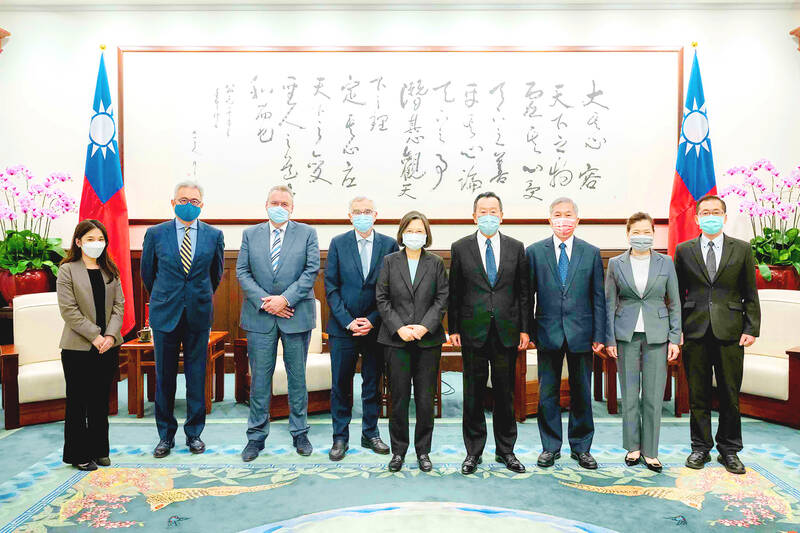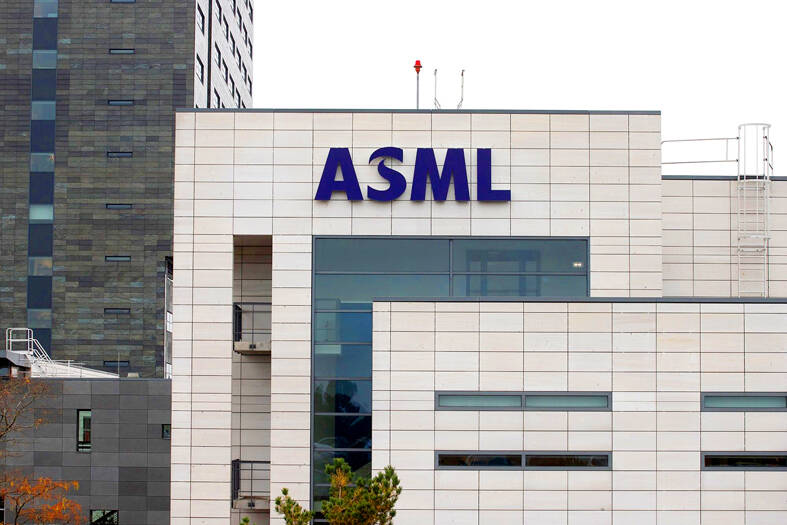Netherlands-based ASML Holding NV, a leading global supplier of chipmaking machinery, on Wednesday announced plans for a factory in New Taipei City to support international customers and the development of the semiconductor industry.
ASML’s announcement came after President Tsai Ing-wen (蔡英文) praised the company’s commitment to continuously investing in Taiwan at a meeting on Tuesday with its chief operations officer, Frederic Schneider-Maunoury.
ASML continues to invest globally and in Taiwan to prepare for the company’s continued growth, and to support global customers and the development of the semiconductor industry, the company said in an e-mail reply to Taiwanese media.

Photo courtesy of the Presidential Office via CNA
Vice Premier Shen Jong-chin (沈榮津), who was at Tuesday’s meeting, said that ASML should begin construction on the New Taipei City project in July next year.
ASML is the world’s sole supplier of extreme ultraviolet lithography (EUV) photolithography machines used by semiconductor manufacturers to produce cutting-edge chips.
It has become one of the foremost wafer-foundry equipment suppliers to Taiwanese manufacturers, including Taiwan Semiconductor Manufacturing Co (台積電), the world’s largest contract chipmaker.

Photographer: Peter Boer/Bloomberg
At Tuesday’s meeting, Tsai told Schneider-Maunoury that investing in Taiwan was “a very correct direction” and that the government would continue to provide support, a press release issued by the Presidential Office said.
ASML has five factories in Taiwan employing more than 4,500 people and plans to increase its investments in the country, the release said.
The company in 2020 launched a global EUV training center for engineers at the Southern Taiwan Science Park (南部科學園區) in Tainan.
ASML’s new project next year would be its biggest investment in Taiwan yet, and the continued cooperation between the company and Taiwan will enhance each other’s semiconductor capabilities, Tsai said in a social media post later on Tuesday.
Tsai said she was grateful that ASML had taken concrete actions to invest at a time when the world is focusing on Taiwan.
“I believe this would dispel the over-hyped risk of investing in Taiwan,” she said.
The company’s teams are based in Hsinchu City, New Taipei City’s Linkou District (林口), Taichung and Tainan, with its first office dating to 2003, ASML’s Web site says.
ASML is aggressively expanding its presence in Asia to enhance collaborations with its largest customers, aiming for significant growth opportunities.
On Wednesday, the company held a groundbreaking ceremony of its new semiconductor cluster in South Korea, home to the world’s two biggest memorychip makers: Samsung Electronics Co and SK Hynix Inc, Yonhap news agency reported.
ASML is building a US$181 million chip cluster in Hwaseong, about 40km south of Seoul, which would include a local repair center, training center, research and development center for parts, and education and experience center, the report said.
The construction is expected to be completed by the end of 2024, it said.
South Korea accounted for 33.4 percent of ASML’s total sales last year, up from 29.7 percent the previous year, company data showed.

TARIFFS: The global ‘panic atmosphere remains strong,’ and foreign investors have continued to sell their holdings since the start of the year, the Ministry of Finance said The government yesterday authorized the activation of its NT$500 billion (US$15.15 billion) National Stabilization Fund (NSF) to prop up the local stock market after two days of sharp falls in reaction to US President Donald Trump’s new import tariffs. The Ministry of Finance said in a statement after the market close that the steering committee of the fund had been given the go-ahead to intervene in the market to bolster Taiwanese shares in a time of crisis. The fund has been authorized to use its assets “to carry out market stabilization tasks as appropriate to maintain the stability of Taiwan’s

STEEP DECLINE: Yesterday’s drop was the third-steepest in its history, the steepest being Monday’s drop in the wake of the tariff announcement on Wednesday last week Taiwanese stocks continued their heavy sell-off yesterday, as concerns over US tariffs and unwinding of leveraged bets weighed on the market. The benchmark TAIEX plunged 1,068.19 points, or 5.79 percent, to 17,391.76, notching the biggest drop among Asian peers as it hit a 15-month low. The decline came even after the government on late Tuesday authorized the NT$500 billion (US$15.2 billion) National Stabilization Fund (國安基金) to step in to buoy the market amid investors’ worries over tariffs imposed by US President Donald Trump. Yesterday’s decline was the third-steepest in its history, trailing only the declines of 2,065.87 points on Monday and

TAKING STOCK: A Taiwanese cookware firm in Vietnam urged customers to assess inventory or place orders early so shipments can reach the US while tariffs are paused Taiwanese businesses in Vietnam are exploring alternatives after the White House imposed a 46 percent import duty on Vietnamese goods, following US President Donald Trump’s announcement of “reciprocal” tariffs on the US’ trading partners. Lo Shih-liang (羅世良), chairman of Brico Industry Co (裕茂工業), a Taiwanese company that manufactures cast iron cookware and stove components in Vietnam, said that more than 40 percent of his business was tied to the US market, describing the constant US policy shifts as an emotional roller coaster. “I work during the day and stay up all night watching the news. I’ve been following US news until 3am

TARIFF CONCERNS: The chipmaker cited global uncertainty from US tariffs and a weakening economic outlook, but said its Singapore expansion remains on track Vanguard International Semiconductor Corp (世界先進), a foundry service provider specializing in producing power management and display driver chips, yesterday withdrew its full-year revenue projection of moderate growth for this year, as escalating US tariff tensions raised uncertainty and concern about a potential economic recession. The Hsinchu-based chipmaker in February said revenues this year would grow mildly from last year based on improving supply chain inventory levels and market demand. At the time, it also anticipated gradual quarter revenue growth. However, the US’ sweeping tariff policy has upended the industry’s supply chains and weakened economic prospects for the world economy, it said. “Now